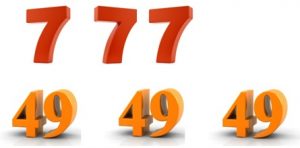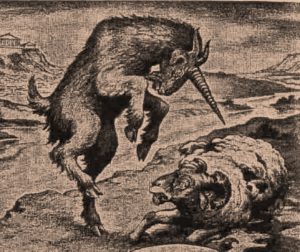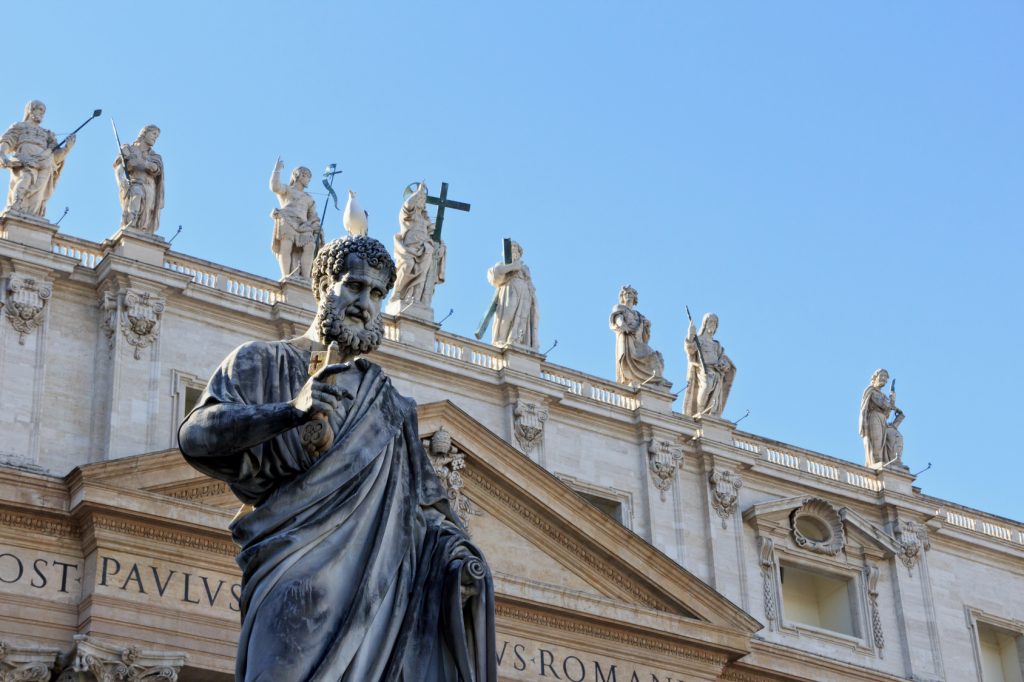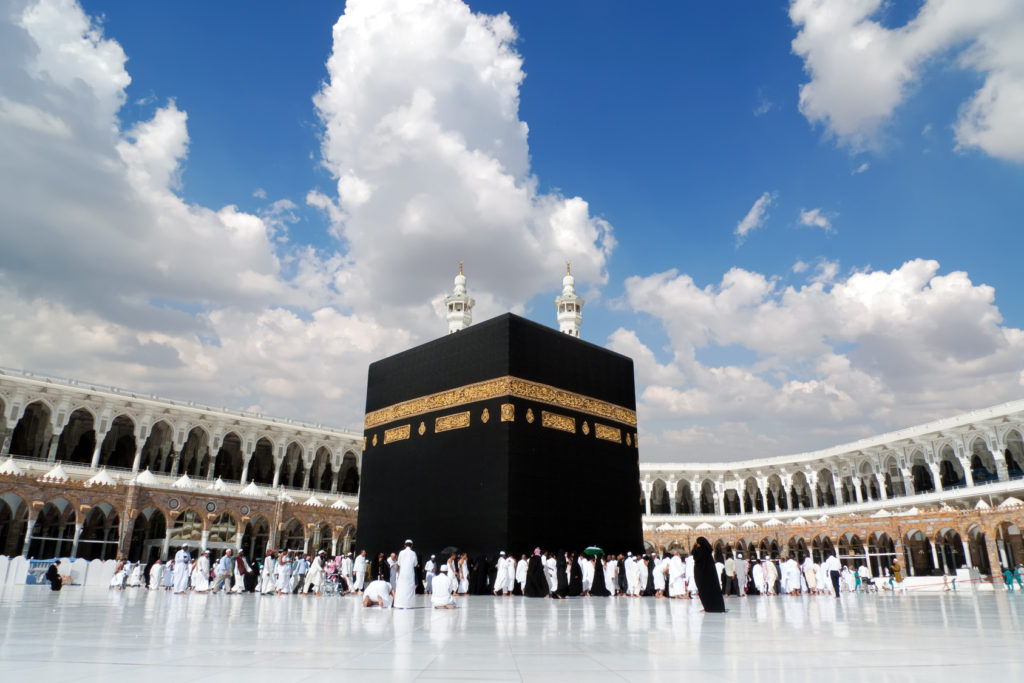
510 BC to 490 BC, Psalm 22: The hind of the dawn.
This site was first built in French (see www.147thgeneration.net). The English translation was mainly done using « google translation ». We have tried to correct the result of this translation to avoid interpretation errors. However, it is likely that there are unsatisfactory translations, do not hesitate to communicate them to us for correction.
(for that click on this paragraph)
Summary
This generation is from the years 510 BC to 490 BC
According to our count, this generation is the 22nd generation associated with Psalm 22. It is in this Psalm 22 that we therefore find an illustration of the facts of this generation.
This generation is very special because, after the destruction of the Temple, its reconstruction followed without the people of Israel needing to fight. The empire, which King David left as an inheritance to his son Solomon, has only held seventeen generations. The kingdom was well established by then and the people of Israel were numerous and strong enough not to have to fear their neighbors.
In this twenty-second generation, the people of Israel are meeting again, gradually, on their land (only the descendants of the kingdom of Judah). But, in terms of numbers or strength, the situation is far less to his advantage. He cannot fight against any of his neighbors. The country is in ruins.
In fact, this second part of the night which begins in this generation and which will last 126 generations, will be much harder for the Jews than the period corresponding to the first 21 generations. The Jewish people will face new, more powerful and more destructive empires. In particular Christianity and then Islam, which will appear soon and which will make the main part of the history to come, will not cease denying the election of the Jewish people to God.
The first cycle of twenty-one generations of the night concerned a people of Israel sovereign but rebellious against God whose main threat was itself. The second cycle, which begins in this generation, which continues to this day, shows a people of Israel constantly faithful to their God. Despite this new fidelity, God will not protect his people from the threats of other peoples. Or at least not visibly. In fact, as the psalm of this generation indicates, in particular its title, if God is not visible in this second part of the night, he is not abandoning his people.
Talk
Hind of the dawn
This generation is very special because, after the destruction of the Temple, it was rebuilt without the need for the people of Israel to fight. But that is what raises David’s concern. If the empire which he left as an inheritance to his son Solomon only lasted seventeen generations, how will the rest of Israel resist during the long period of night that must pass. Be still more than one hundred and twenty generations.
Thus, the title of this psalm can help us better understand its deeper meaning.

- For the conductor, on the ayeleth hashachar (- The hind of the dawn –), a song of David.
Indeed the title, in addition to the usual titles, such as « a song of David » or « For the conductor » includes an original mention: according to « the ayeleth hashachar (- The hind of the dawn –).
In the Zohar, we find this passage:
- Rabbi Hiya the Great [1] went to the teachers of the Law to learn. When he arrived near Rabbi Simeon bar Yohai, he saw that his house was divided in two by a wall of fire. Surprised, Rabbi Hiya said to himself: I am going to stop here; perhaps I will hear the words of Rabbi Simeon from here. He heard saying, « It is written: Flee, my beloved, and be like a deer or a hind’s fawn. » This is all that Israel asks of the Creator; for Rabbi Simeon said: « What Israel longs for is that the Holy One, blessed be He, be removed from Him other than in the particular manner from which the deer and hind’s fawn fly » . Why ? Rabbi Simeon says: « No animal in the world imitates the deer or hind’s fawn who, fleeing, travel a short space and turn their head to the place from which they have just fled, and all the time their flight always turns their heads back.
- In the same way, Israel says to God: « Master of the universe, if we ever cause you to withdraw from us, may it please you to go away from us in the manner of the deer and the way of the hind’s fawn who, while fleeing, turn their heads towards the place they have just left « . So the scripture says: « when they are in the land of their enemies, I will not reject them or abhor them so as to destroy them completely. »
7, 21, 49, 147
In fact, we arrive at a pivotal generation, the people of Israel return to their land after the first exile of Babylon, but that does not mean the end of the night, quite the contrary.
The duration of the night is one hundred and forty-seven generations, or three « series » of forty-nine generations. The forty-nine first correspond to the curses of Leviticus, the last ninety-eight (twice forty-nine) correspond to those of Deuteronomy.
In Leviticus, God first announced seven curses and then announced:
- If after [2] all this you will not listen to me, I will punish you for your sins seven times over.
The people of Israel are first punished seven times, then in a second time forty-nine times (in totality) seven times seven.
If we apply this to the three « sets » of forty-nine curses, this gives us a first level of twenty-one curses (three times seven), the second level completes these curses to arrive at the sevenfold, or one hundred and forty-seven.
We are in the twenty-second generation, that is to say that the first sequence of twenty-one curses has just ended, this is materialized by the return of exile from Babylon. But this is also the beginning of the second sequence of one hundred and twenty-six curses (the one hundred and forty-seven curses minus the twenty-one already suffered) and the people of Israel thus enters the deepest of the night.
To approach the first sequence, the people of Israel were strong. Indeed the first generation began with the death of Solomon, the kingdom was then well established and the people of Israel sufficiently numerous and strong not to have to fear its neighbors.
In this twenty-second generation, the people of Israel are once again reunited on their land (only the descendants of the kingdom of Judah), but with regard to its number or strength, the situation is much less to the advantage of this one. He can not fight any of his neighbors.
This is what will provoke David’s supplication in this psalm. It begins with the title. David does not question the judgment of God who will still subject his people to curses for more than one hundred and twenty generations.
God will not bring help to his people until he has suffered the announced curses.
After the passage we have just quoted from Leviticus where God indicates « I will continue to test you seven times, » follow the curses properly so called.
Then He concludes with the passage quoted by the Zohar as an illustration of his commentary on the « Song of Songs »: « I will not reject them or abhor them so as to destroy them completely[8]. »
God and his people
Thus, the deer’s flight symbolizes God’s relationship with his people.
God gives the impression of abandoning his people and fleeing him, but in fact he does not abandon him.
For if God moves away from His people, He does so by keeping His face facing His people to make sure that He does not perish completely. Thus, in spite of appearances, the people of Israel are not neglected, and will come the day when God will come again to his people to restore his place among the nations.
But before that, it is necessary that the people of Israel cross its night and subsist until dawn, until God remembers his people. Until God replaces rigor with mercy. Let the deer, the rigor of the male, give way to the hind, the mercy of the female. When David evokes the doe of the dawn, he evokes the final Mercy of God to his people.
This is the object of the title of the psalm:

- For the conductor, on the ayeleth hashachar (The hind of the dawn), a song of David.
This psalm is thus a supplication of David to God so that during the rest of the night that the people of Israel must go through, God can apply his anger with measure. So that the people of Israel can at least reach dawn to find again the love of their God.
It is in this context that we must interpret the beginning of the psalm:

- My God, my God, why have You forsaken me? [You are] far from my salvation [and] from the words of my moaning.
- My God, I call out by day and You do not reply, and at night I do not keep silent.
- But You are holy; You await the praises of Israel.
- Our ancestors trusted in You; they trusted and You rescued them.
- They cried out to You and they escaped; they trusted in You and they were not shamed.
The day corresponds to the combined reigns of David and Solomon that took place while the people of Israel were still in the day and during which they had largely interceded for their people. The night obviously corresponds to the night that the people of Israel have undergone since the death of Solomon, and which David witnesses through his psalms.
A dark future
The situation indeed for this generation of rebirth is not very brilliant.
To imagine it, we can refer to the beginning of the book of Nehemiah (although this book is later than this generation, the situation described is well representative of the return of exile and describes a situation that has lasted since this one) :
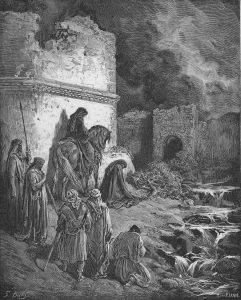
- The[9] words of Nehemiah the son of Hacaliah. And it came to pass in the month of Kislev [in] the twentieth year that I was in Shushan the capital.
- There came Hanani, one of my brethren, he and men from Judea, and I asked them about the Jews who had escaped, who remained of the captivity, and about Jerusalem.
- And they said to me, « The remnant who remained of the captivity in the province are in great trouble and reproach; and the wall of Jerusalem is breached, and its gates were burned with fire. »
- And it came to pass when I heard these words that I sat and wept, and I mourned for days, and I fasted and prayed before the God of heaven.
This misery of the people of Israel after exile justifies the following verse of the psalm which expresses David’s dismay at this situation:

- But I am a worm and not a man; a reproach of man, despised by peoples.
In fact, the first cycle of twenty-one generations of the night concerned a people of Israel sovereign but rebellious to God whose main threat was itself.
The second cycle, which continues today, shows a people of Israel who no longer possess power and who are under constant threat from other peoples of the earth.
In this cycle, unlike the first, the people of Israel will be constantly faithful to their God and will be constantly reproached for this seemingly fruitless attachment. Because, despite himself, God will not protect his people from the threats of other peoples, or at least not visibly.
This vulnerability to other peoples and their taunts about the irrational fidelity of the people of Israel to their God is expressed in the following verses of the psalm:

- All who see me will mock me; they will open their lips, they will shake their head.
- One should cast his trust upon the Lord, and He will rescue him; He will save him because He delights in him.
- For You drew me from the womb; You made me secure on my mother’s breasts.
- Upon You, I was cast from birth; from my mother’s womb You are my God.
- Do not distance Yourself from me, for distress is near; for there is none to help.
Daniel’s vision
As for the successive attacks of other peoples, they are mentioned in Daniel:
- In[10] the third year of Balshazzar’s kingdom, a vision appeared to me-I, Daniel-after what had appeared to me in the beginning.
- And I saw in the vision, and it came to pass when I saw-and I was in Shushan the capital, which is in the province of Elam-and I saw in the vision that I was beside the river Ulai.
- And I lifted my eyes, and I saw, and behold a ram was standing before the river, and it had horns, and the horns were high, and one was higher than the other, and the higher one sprouted last.
- I saw the ram goring westward, northward, and southward, and no beasts could stand before it, and no one could save [anyone] from its hand, and it did according to its will, and it grew.
- And I was pondering, and behold a he-goat came from the west over the surface of the entire earth, and it did not touch the ground, and the goat had a conspicuous horn between its eyes.
- And it came to the horned ram that I saw standing before the river, and it ran toward it with the fury of its power.
- And I saw it coming up to the ram, and it fought with it, and it struck the ram and broke both of its horns, and the ram had no strength to stand before it; so it cast it to the ground and trampled it, and there was no one to save the ram from its hand.
- And the he-goat waxed exceedingly huge, and when it became strong, the great horn broke, and an appearance of four sprouted in its stead, to the four directions of the heavens.
- And from one of them emerged a small horn, and it became very great to the south and to the east and to the coveted land.
When the successive attacks of other peoples are mentioned in the book of Daniel. The different animals and horns mentioned in this story are the different empires that will succeed each other and for which the people of Israel will be only a spectator.
The empires evoked are among others those of Alexander the Great and Antiochius Epiphanes. These empires will be only the first of a long series, from the Roman Empire to the recent Nazi regime.
It is this long journey evoked by the following verses of the psalm:

- Great bulls have surrounded me; the mighty ones of Bashan encompassed me.
- They opened their mouth against me [like] a tearing, roaring lion.
- I was spilled like water, and all my bones were separated; my heart was like wax, melting within my innards.
- My strength became dried out like a potsherd, and my tongue cleaves to my palate; and You set me down in the dust of death.
As we have seen before, the goat represents Esau (this will not be explained on this website). But the empires that will succeed each other during this second cycle are well placed under the sign of the West and therefore of Esau.
Bulls
On the other hand, the bull represents the priesthood (this will not be explained on this website). When David evokes many bulls, he does not mention the priests of Israel, but those of the descendants of Esau who will try to appropriate during this second cycle the priesthood of the people of Israel.
The people of Israel, at first impotent before the successive empires, can not avoid the emergence of new monotheistic religions such as Christianity and Islam.
But if Isaac had blessed Esau with the power to bring light to the pagan lands, only the people of Israel had to secure the priesthood.
But instead, Christianity, which will first be a close religion and next to Judaism, will move away from it to compete with it.
It is these bulls, these new religions that David fears, because he knows that throughout this second cycle they will be a major risk to the survival of his descents. This is expressed in the rest of the Psalm passage that we quoted. With regard to the new monotheisms, it is interesting to quote the following passage from the Gospels:
- The people [3] stood watching, and the rulers even sneered at him. They said, “He saved others; let him save himself if he is God’s Messiah, the Chosen One.”
- The soldiers also came up and mocked him. They offered him wine vinegar 37 and said, “If you are the king of the Jews, save yourself.”
- There was a written notice above him, which read: this is the king of the jews.
- One of the criminals who hung there hurled insults at him: “Aren’t you the Messiah? Save yourself and us!”
This passage is reminiscent of Psalm 22, which is the subject of this chapter. In particular, we can draw a parallel with the following passage (that we have already quoted):

- All who see me will mock me; they will open their lips, they will shake their head.
- One should cast his trust upon the Lord, and He will rescue him; He will save him because He delights in him.
But if we take the passage of the Gospels that precedes the preceding quote, we have:
- When [4] they came to the place called the Skull, they (Romans) crucified him (Jesus) there, along with the criminals — one on his right, the other on his left.
- Jesus said, “Father, forgive them, for they do not know what they are doing.” And they divided up his clothes by casting lots.
This is to be compared with the following verses of Psalm twenty-two:

- For dogs have surrounded me; a band of evildoers has encompassed me, like a lion, my hands and feet.
- I tell about all my bones. They look and gloat over me.
- They share my garments among themselves and cast lots for my raiment.
But those who attack Jesus are the Romans, the descendants of Esau or at least their representation.
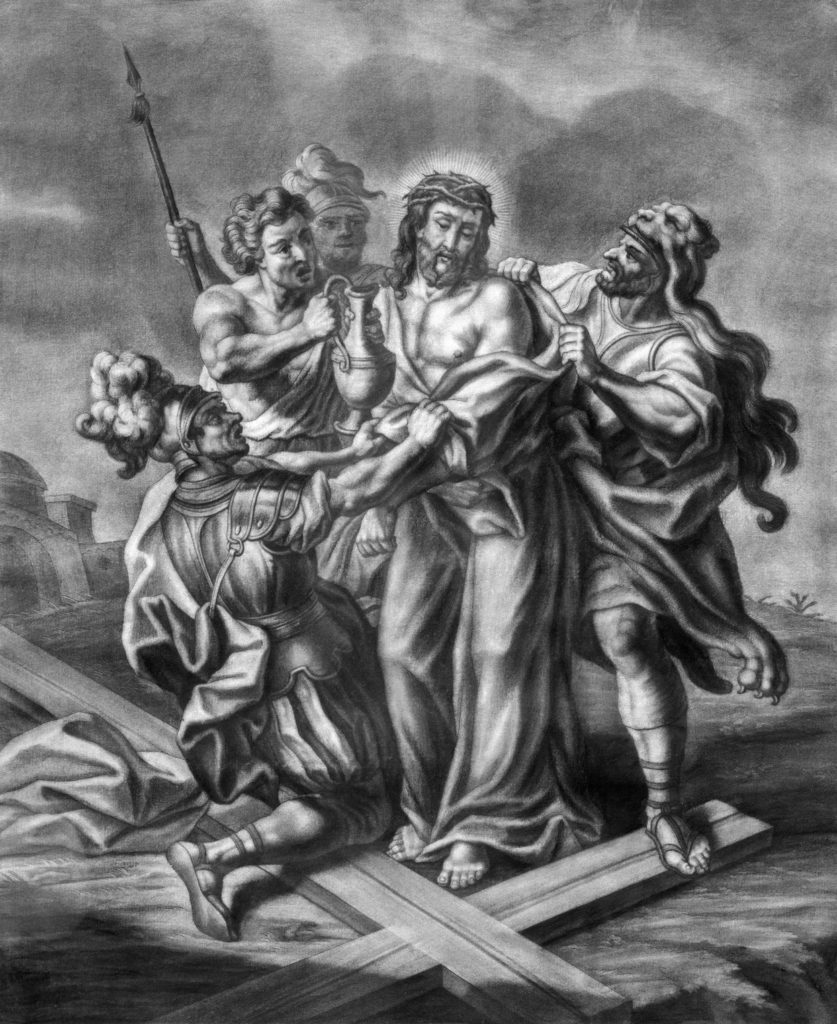
Jesus is a pious Jew, and his clothes conform to the Jewish tradition, in particular, they include the ritual fringes.
By appropriating these clothes and fringes, while proclaiming in the aftermath, Jesus, King of the Jews [5], they symbolically appropriate the worship reserved for the people of Israel.
The Romans will gradually turn away from the message of Jesus who wanted the Gentiles to turn to the Lord to receive the light.
Instead, Christianity will become an obscurantist religion, which instead of being at the side of the people of Israel will be for many centuries its declared enemy.
This completely ignores the message of Jesus.
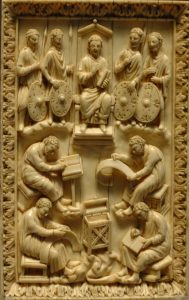
For if the Gospel that we have just quoted provides through the personalization that represents Jesus, the stripping of the Jewish people by the future church, he also announces his future redemption:
- He said [6] (Jesus addresses the disciples after his resurrection) to them, “This is what I told you while I was still with you: Everything must be fulfilled that is written about me in the Law of Moses, the Prophets and the Psalms.”
- Then he opened their minds so they could understand the Scriptures.
- He told them, “This is what is written: The Messiah will suffer and rise from the dead on the third day,
- and repentance for the forgiveness of sins will be preached in his name to all nations, beginning at Jerusalem.
The Fulfillment of the Psalms
Apart from Christian considerations on the resurrection of Jesus, it follows from this passage that the salvation of the world can not take place without that of the people of Israel. This one first undergo the one hundred and forty-seven generations of curse announced in order to gain access to the place reserved for him with God. Only then can the salvation of other peoples be considered.
If the gospel concludes that salvation will only take place after the psalms are fulfilled, it means that all generations materialized by the psalms of David must flow for the final salvation to take place.
This includes the first one hundred and forty-seven psalms that are associated with the one hundred and forty-seven generations of the night that the people of Israel must undergo. For it is these generations that will provide access to the last three Psalms that materialize the salvation of Israel, the rebuilding of Jerusalem and the salvation of other peoples.
This second cycle during which the people of Israel will have to suffer repeated attacks from other peoples is also announced by the Qur’an, in the following passage:
- And [7] We conveyed to the Children of Israel in the Scripture that, « You will surely cause corruption on the earth twice, and you will surely reach [a degree of] great haughtiness.
- Traditionally, the first part of this verse is associated with the destruction of the two temples of Jerusalem. For the second part of other English translations use the terms: exaltation, arogance or even insolence. All these translations, however, evoke an end of disgrace for the people of Israel.
This announcement, which is mentioned in the Surah, which is called either « The Night Journey » (recalling that of Muhammad, which may have been presented to God) or « The Sons of Israel », is particularly relevant to describe « The Night Journey ». of the people of Israel.
Indeed, if the night Israel experiences is terrible, the hope of dawn makes it softer. It is this dawn confirmed by the Gospels and the Quran that David evokes in this psalm to counterbalance the hardness of the second cycle which is initiated by this twenty-second generation. Thus, as the title of this psalm evokes, it is the hind of the dawn that David evokes in the end of this psalm. The hind of the dawn, the return of God to his people and the end of the disgrace. The salvation of the people of Israel for the salvation of the people:

(extract of the psalm 22 associated to this generation, verses 20 to 32 )
- But You, O Lord, do not distance Yourself; my strength, hasten to my assistance.
- Save my soul from the sword, my only one from the grip of the dog.
- Save me from the lion’s mouth, as from the horns of the wild oxen You answered me.
- I will tell Your name to my brothers; in the midst of the congregation I will praise You.
- You who fear the Lord, praise Him; all the seed of Jacob, honor Him, and fear Him, all the seed of Israel.
- For He has neither despised nor abhorred the cry of the poor, neither has He hidden His countenance from him; and when he cried out to Him, He hearkened.
- Because of You is my praise in the great congregation; I pay my vows in the presence of those who fear Him.
- The humble shall eat and be sated; they shall praise the Lord, those who seek him; your hearts shall live forever.
- All the ends of the earth shall remember and return to the Lord, and all the families of the nations shall prostrate themselves before You.
- For the kingship is the Lord’s, and He rules over the nations.
- They shall eat all the best of the earth and prostrate themselves; before Him shall all those who descend to the dust kneel, and He will not quicken his soul.
- The seed that worships Him; it shall be told to the generation concerning the Lord.
- They shall come and tell His righteousness to the newborn people, that which He has done.

[1] ZOHAR II (Shemot section) 14a, which first quotes » Shir Hashirim – Song of Songs – Chapter 8, verse 14″ and concludes with a quote from « Vayikra – Leviticus – Chapter 26, verse 44 ».
[2] Vayikra – Leviticus – Chapter 26, verse 18, Following the translation of « New International Version«
[3] Luke (New International Version (NIV) ), Chapter 23, verses 35 to 39
[4] Luke (New International Version (NIV) ), Chapter 23, verses 33 and 34
[5] See: Luke, Chapter 23, verse 38.
[6] Luke (New International Version (NIV) ), Chapter 24, verses 44 to 47
[7] The Quran, Chapter 17, The Night Journey, « al-Isrā »ʾ ( الإسراء ), verse 4. (Translation from: « Sahih International » version)
[8] Vayikra – Leviticus – Chapter 26, verse 44.
[9] Nechemiah – Nehemiah – Chapter 1, verses 1 to 4
[10] Daniel – Chapter 8, verses 1 to 9


